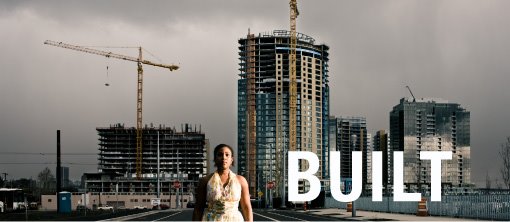so, this weekend
we worked alot with stories, and ways to exchange stories
and today, we listened to a podcast from a Chicago Public Radio panel event in February
about "Gentrification"
It raised some great questions for us
some of which have been brought up before on this blog, some of which
not so much...
a question i'd ask anyone to respond to, here, just to launch a conversation-
If your tax dollars are supporting public housing for those in need, who should have what level of voice in determining the nature and design of that housing?
You?
Those who live there?
Neither...?
A Show / A Public Conversation / A Participatory Civic Planning Adventure
interesting links and articles
- Pica Blog Response to BUILT
- BUILT Review from The Oregonian
- Radio interview with Michael Rohd about BUILT
- Portland as a bubble? Article...
- BUILT PRODUCTION BLOG
- Brief cellphone video from our Hartford performance/civic event with Hartbeat Ensemble at City Hall in Hartford, CT on June 10, 2008
- Cabrini Green residents and the Chicago "Plan"
- Gentrification and "Upzoning" in the City
- Homelessness in Portland- Mercury Blog post, and comments
- List of dozens of recent articles that pertain to mixed-income housing, the Plan for Transformation, and the displacement that resulted from this plan
- LISTEN: public housing/gentrification panel
- michael rakowitz interview...
- NPR story on BUILT events in Hartford
- Portland SOWA Artist-In-Residence program
- TBA Festival in Portland
- urban to suburban migration- culture and tension
Subscribe to:
Post Comments (Atom)

4 comments:
i feel like this is an obvious answer but i'll say it anyway:
people who live there should be able to express their needs, i.e. i am a single parent, so i need a kitchen that is open to the living room, so i can watch my kids while i cook.
then those needs need to be put to a group of designers who work within budgetary constraints to create the best possible living space.
when we pay taxes we may know what we are supporting, schools, roads, etc...but we don't know the specifics, nor do we really need to. seems like if somebody got in there and was allowed to say, "no, they can't have a play place in the middle of that public housing development, i don't want to pay for that, that's frivolous", when probably, it's not, that would be ineffective. that part needs to be left to experts.
i agree with most of what Courtney said. We pay tax dollars to the military too and no one has once asked me my opinion before bombing or invading another country.
interesting, though, this idea of "experts" - i say that here, the experts are the people who are living in public housing - who knows better than them what they need? Sure, a developer or architect might know more about how to create the space that the residents want with limited resources. I think what would be important is to have conversations between the city, the developers and the future tenants to figure out the best way to build.
I think that this is a case where its easy to but it into a dialectic (thats for you Harry) but I'm not sure its that cut and dried...Sure, who knows better what they need then the person who lives there (and Courtney's example is a really small but powerful illustration of that) but I keep coming back to a line from an improvisation way back when, when someone playing a city planner/developer said "I went to school to study this, I have a degree, do you?" and I think that that perspective is important to keep in mind. Yes, the people who live in public housing should absolutely be involved in the conversation, but I personally am uncomfortable raising them to the status of experts...If someone wants something ridiculous or cost prohibitive or architecturally unsound in their home (and that is oversimplifying it for sure, but I come back to the gallery style housing argument from the podcast) I don't think that just because they live there, or live in one unit of many, they should get the biggest vote. They aren't funding it or building it...This may not be a great analogy, but for me, I think that theatre is for the audience (in the same way that public housing is for the public housing residents) but that doesn't mean that I want the people sitting in the seats to have the same input in what they are watching as I do when I am directing, you know? I have the training and put in the hours, I think in that situation I am the expert. I would never cut the audience and their opinions out of the equation totally, but they also don't have equal footing.
in response to josh -
i think that what we're doing with this project is a great example of this question - do we, as the "theatre experts" have a more important opinion than the community members / audience?
it seems as though Built is taking a step in the direction of giving the audience more of a voice in the process, we are giving up part of our authority as "experts"
could this be a new type of creation that could be used in other aspects of life, ie, giving public housing residents more opportunity to share their opinions with the "experts" ?
Post a Comment